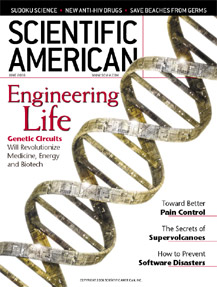July 1, 2006
A recent brain-imaging study shows that our political predilections are a product of unconscious confirmation bias
The human understanding when it has once adopted an opinion … draws all things else to support and agree with it. And though there be a greater number and weight of instances to be found on the other side, yet these it either neglects and despises … in order that by this great and pernicious predetermination the authority of its former conclusions may remain inviolate.
—Francis Bacon, Novum Organum, 1620
Pace Will Rogers, I am not a member of any organized political party. I am a libertarian. As a fiscal conservative and social liberal, I have found at least something to like about each Republican or Democrat I have met. (continue reading…)
June 1, 2006
How the evidence for anthropogenic global warming has converged to cause this environmental skeptic to make a cognitive flip
In 2001 Cambridge University Press published Bjorn Lomborg’s book The Skeptical Environmentalist, which I thought was a perfect debate topic for the Skeptics Society public lecture series at the California Institute of Technology. The problem was that all the top environmental organizations refused to participate. “There is no debate,” one spokesperson told me. “We don’t want to dignify that book,” another said. One leading environmentalist warned me that my reputation would be irreparably harmed if I went through with it. So of course I did.
My experience is symptomatic of deep problems that have long plagued the environmental movement. Activists who vandalize Hummer dealerships and destroy logging equipment are criminal ecoterrorists. Environmental groups who cry doom and gloom to keep donations flowing only hurt their credibility. As an undergraduate in the 1970s, I learned (and believed) that by the 1990s overpopulation would lead to worldwide starvation and the exhaustion of key minerals, metals and oil, predictions that failed utterly. Politics polluted the science and made me an environmental skeptic. (continue reading…)
May 1, 2006
The Self-Help and Actualization Movement is an $8.5-billion-a-year business. Does it work?
According to self-help guru Tony Robbins, walking barefoot across 1,000-degree red-hot coals “is an experience in belief. It teaches people in the most visceral sense that they can change, they can grow, they can stretch themselves, they can do things they never thought possible.”
I’ve done three fire walks myself, without chanting “cool moss” (as Robbins has his clients do) or thinking positive thoughts. I didn’t get burned. Why? Because wood is a poor conductor of heat, particularly through the dead calloused skin on the bottom of your feet and especially if you scoot acros the bed of coals as quickly as fire walkers are wont to do. Think of a cake in a 400-degree oven — you can touch the cake, a poor conductor, without getting burned, but not the metal cake pan. Physics explains the “how” of fire walking. To understand the “why,” we must turn to psychology. (continue reading…)
April 1, 2006
Are some people really luckier than others, or is it all in their heads? Both
Amyotrophic lateral sclerosis (ALS) is a neuromuscular disease that attacks motor neurons until muscle weakness, atrophy and paralysis lead inexorably to death. Victims of this monstrous malady could be forgiven for feeling unlucky.
How, then, can we explain the attitude of the disease’s namesake, baseball great Lou Gehrig? He told a sellout crowd at Yankee Stadium: “For the past two weeks you have been reading about the bad break I got. Today I consider myself the luckiest man on the face of this earth.” The Iron Horse then recounted his many blessings and fortunes, a list twice punctuated with “I’m lucky” and “That’s something.”
Clearly, luck is a state of mind. Is it more than that? To explore this question scientifically, experimental psychologist Richard Wiseman created a “luck lab” at the University of Hertfordshire in England. Wiseman began by testing whether those who believe they are lucky are actually more likely to win the lottery. He recruited 700 subjects who had intended to purchase lottery tickets to complete his luck questionnaire, which is a self-report scale that measures whether people consider themselves to be lucky or unlucky. Although lucky people were twice as confident as the unlucky ones that they would win the lottery, there was no difference in winnings. (continue reading…)
March 1, 2006
Natural scams “he” doesn’t want you to know about
Up to 139 times in one week, Kevin Trudeau pitches late-night viewers about his self-published book, Natural Cures “They” Don’t Want You to Know About, a rambling farrago of uninformed opinions, conspiracy theories, and cheeky jabs at medical, pharmaceutical and governmental authorities (“they”). The book is so risibly ridiculous that even the most desperately ill would not take it seriously — would they?
Apparently they would, to the tune of millions of copies sold, elevating the book to the New York Times best-seller list. If readers had purchased Trudeau’s Mega Memory System, perhaps they would have remembered that he spent two years in federal prison after pleading guilty to credit-card fraud and that the Federal Trade Commission banned Trudeau “from appearing in, producing, or disseminating future infomercials that advertise any type of product, service, or program to the public, except for truthful infomercials for informational publications. In addition, Trudeau cannot make disease or health benefits claims for any type of product, service, or program in any advertising, including print, radio, Internet, television, and direct mail solicitations, regardless of the format and duration.” Trudeau had to pay $500,000 in consumer redress for his bogus infomercials and another $2 million to settle charges against him for claiming that coral calcium cures cancer (it doesn’t) and that an analgesic product called Biotape permanently relieves pain (it doesn’t). (continue reading…)






